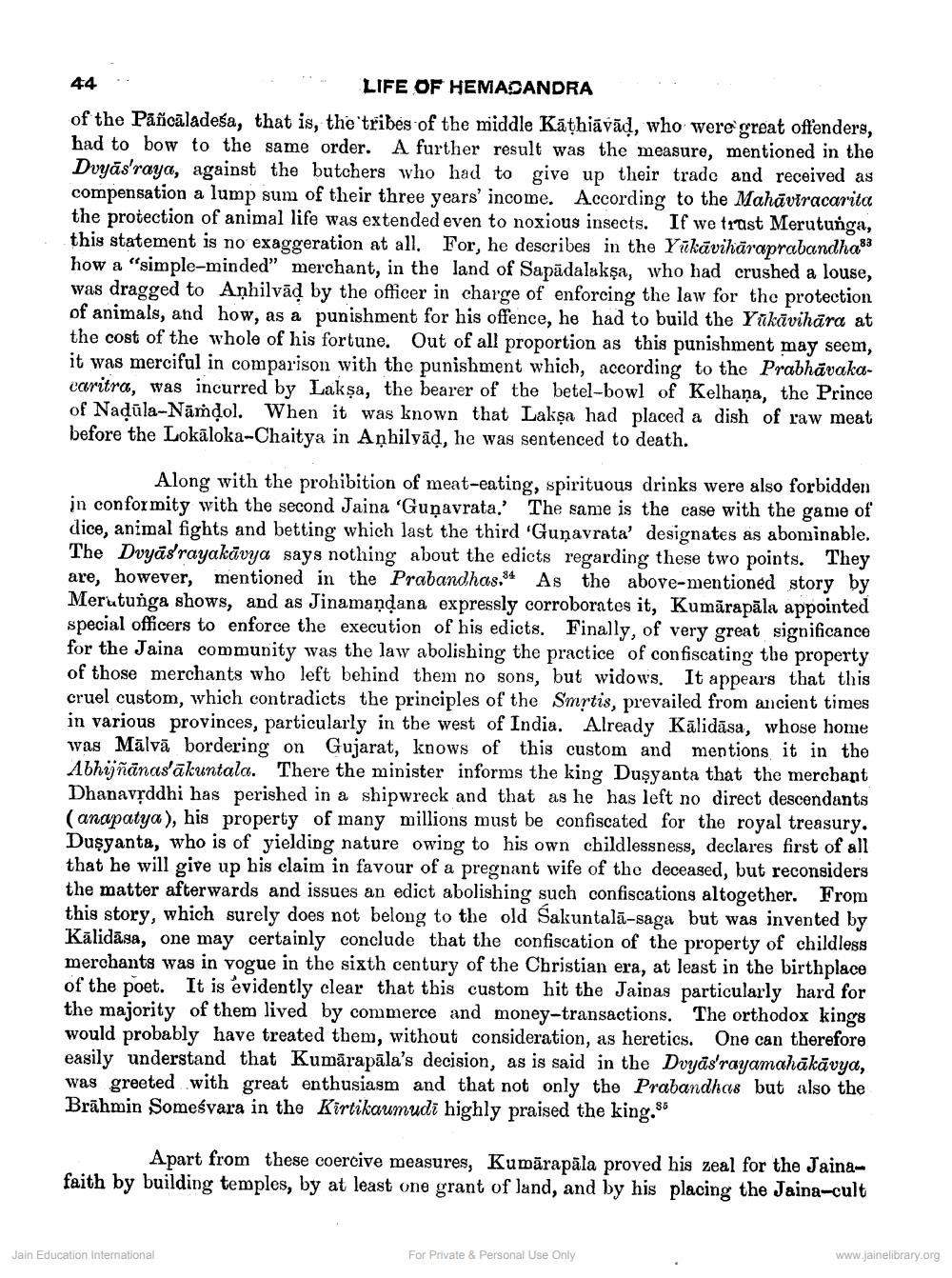________________
44
LIFE OF HEMASANDRA of the Pāñcāladeśa, that is, the tribes of the middle Kathiāvād, who were great offenders, had to bow to the same order. A further result was the measure, mentioned in the Dvyās'raya, against the butchers who had to give up their trade and received as compensation a lump sum of their three years' income. According to the Mahāvīracarita the protection of animal life was extended even to noxious insects. If we trust Merutunga, this statement is no exaggeration at all. For, he describes in the Yükāvihāraprabandha83 how a "simple-minded” merchant, in the land of Sapädalakşa, who had crushed a louse, was dragged to Aṇhilvād by the officer in charge of enforcing the law for the protection of animals, and how, as a punishment for his offence, he had to build the Yükāvihāra at the cost of the whole of his fortune. Out of all proportion as this punishment may seem, it was merciful in comparison with the punishment which, according to the Prabhāvakacaritra, was incurred by Lakşa, the bearer of the betel-bowl of Kelhaņa, the Prince of Nadūla-Nămdol. When it was known that Lakșa had placed a dish of raw meat before the Lokāloka-Chaitya in Anhilväd, he was sentenced to death.
Along with the prohibition of meat-eating, spirituous drinks were also forbidden in conformity with the second Jaina 'Guņavrata.' The same is the case with the game of dice, animal fights and betting which last the third 'Guņavrata' designates as aboninable. The Dvyās'rayakāvya says nothing about the edicts regarding these two points. They are, however, mentioned in the Prabandhas,84 As the above-mentioned story by Merutunga shows, and as Jinamaņdana expressly corroborates it, Kumārapāla appointed special officers to enforce the execution of his edicts. Finally, of very great significance for the Jaina community was the law abolishing the practice of confiscating the property of those merchants who left behind them no sons, but widows. It appears that this cruel custom, which contradicts the principles of the Smrtis, prevailed from ancient times in various provinces, particularly in the west of India. Already Kālidāsa, whose home was Mālvā bordering on Gujarat, knows of this custom and mentions it in the Abhijñānas'ākuntala. There the minister informs the king Duşyanta that the merchant Dhanavęddhi has perished in a shipwreck and that as he has left no direct descendants (anapatya), his property of many millions must be confiscated for the royal treasury. Duşyanta, who is of yielding nature owing to his own childlessness, declares first of all that he will give up his claim in favour of a pregnant wife of the deceased, but reconsiders the matter afterwards and issues an edict abolishing such confiscations altogether. From this story, which surely does not belong to the old Sakuntalā-saga but was invented by Kālidāsa, one may certainly conclude that the confiscation of the property of childless merchants was in vogue in the sixth century of the Christian era, at least in the birthplace of the poet. It is evidently clear that this custom hit the Jainas particularly hard for the majority of them lived by commerce and money-transactions. The orthodox kings would probably have treated them, without consideration, as heretics. One can therefore easily understand that Kumārapāla's decision, as is said in the Duyās'rayamahākāvya, was greeted with great enthusiasm and that not only the Prabandhas but also the Brāhmin Someśvara in the Kirtikaumudi highly praised the king. 85
Apart from these coercive measures, Kumārapāla proved his zeal for the Jainafaith by building temples, by at least one grant of land, and by his placing the Jaina-cult
Jain Education International
For Private & Personal Use Only
www.jainelibrary.org




